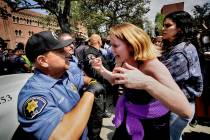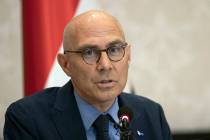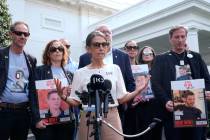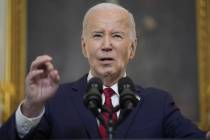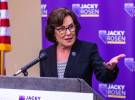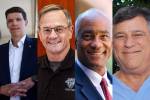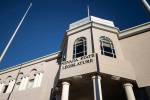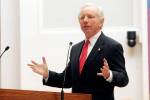GOP targets state Senate
The Nevada Republican Party is undertaking a major drive to retake control of the state Senate and pick up more than half a dozen Assembly seats, helped by 17 term-limit retirements in both houses and a recession-sparked feeling of voter disappointment with the Democratic Party in power.
As part of the effort, GOP leaders are recruiting newcomers to politics and are targeting vulnerable districts where Democrats don't dominate or where there's a Democratic primary.
"We think we can flip at least two Senate districts, which would put us back in the majority," said Brent Husson, executive director of the Nevada Republican Party, on Wednesday. "There are seats in play now that normally under other circumstances wouldn't be in play."
Senate Majority Leader Steven Horsford, D-Las Vegas, said the Democratic Party is doing all it can to make sure Republicans fail and is raising money and organizing with the goal of increasing its numbers. He has raised more than $500,000 for himself, his leadership PAC and the Democratic caucus, according to financial reports filed in January for 2009.
"I feel very good about not only holding the majority but growing it," Horsford said. "After 20 years of the Republican majority in the Senate, you see the situation we're in as a state. The last thing we need to do is go backwards. Ultimately, it's the voters who will decide."
And it's the Nevada voters who will have to live with historic budget decisions that the next Legislature will make after it begins Feb. 1, 2011.
The Democrat-controlled Senate and Assembly and Republican Gov. Jim Gibbons haven't been able to resolve the state's economic crisis, prompting Gibbons to call a special legislative session Feb. 23 to find $881 million in cuts to balance the state's $6.9 billion, two-year budget.
A year from now, the new Legislature and its fresh crop of lawmakers must make longer-term decisions about everything from how many health and welfare services to provide to how much funding to give schools and universities. And they must figure out how to pay for it, perhaps with more or new taxes, something both parties have said is off the table in the special session. But Democratic leaders have signaled higher taxes might come in 2011 as part of a "broader, more stable and fair tax structure," as Horsford put it in his response to Gibbons' State of the State address this week.
Blocking taxes is the main reason Republicans want to take back the Senate.
Parties eye possible senate targets
Topping the Senate target list is the seat of Sen. Joyce Woodhouse, D-Henderson, who is running for re-election. There are 48,000 registered Democrats, 44,000 registered Republicans and 22,000 voters who declared themselves independent or nonpartisan in the district, according to Husson.
The Republican-backed candidate is Michael Roberson, a lawyer who handles small business and development, sectors that have been dragged down by the dismal economy in Nevada. He said he has lived in the state 10 years and has helped in political fundraising, but this is his first bid for public office.
"The situation here in Nevada has gotten so dire that it's gotten to the point where I felt I needed to get involved by actually running for election," Roberson said Wednesday. "I've grown frustrated with what's going on in Carson City."
The other GOP-targeted seat belongs to Las Vegas Sen. Terry Care in District 7, who can't run again because of the constitutional, 12-year term limits just starting to take effect in Nevada.
The district has been historically Democratic, and the party enjoys a 2-to-1 registration advantage over Republicans, 40,000 to 20,000. But two Democrats are competing in the primary -- Assemblyman Mark Manendo and Assemblywoman Kathy McClain -- and the party isn't endorsing either one to stay neutral in the race. Republicans think that leaves an opening to take the seat.
"It's a long shot," acknowledges Husson, who said the Republican candidate the party has recruited hasn't made a formal announcement yet, and so he wouldn't release the name.
Alisa Nave, executive director of the Nevada Senate Democratic caucus, scoffs at the notion the party can lose that Senate seat or that Republicans have a shot at a takeover.
"That district has and always will be Democratic," Nave said. "And both Mark and Kathy are extremely good legislators and candidates."
As for the Woodhouse seat, Nave said the party is "prepared for the worst but we will run an extremely aggressive campaign. Joyce Woodhouse has proven herself as a leader. She will return."
Roberson said he is prepared to spend several hundred thousand dollars to beat Woodhouse.
Now, 12 Democrats and nine Republicans sit in the Senate, which Democrats retook for the first time in 18 years after a Democratic Party registration drive in 2008 in the state, which helped send Barack Obama to the White House.
Seven senators are termed out in 2010, including four Democrats and three Republicans:
• Sen. Terry Care, D-Las Vegas.
• Sen. Maggie Carlton, D-Las Vegas.
• Sen. Bob Coffin, D-Las Vegas.
• Sen. Bernice Mathews, D-Reno.
• Sen. Mark Amodei, R-Carson City.
• Sen. Randolph Townsend, R-Reno.
• Sen. Maurice Washington, R-Sparks.
Horsford said the party is confident it can hold the four Democratic seats and is targeting the Washington seat for a possible switch to Democrat. He said the party is focusing on three more GOP seats where Democrats have a chance to win:
• District 8, held by Sen. Barbara Cegavske, R-Las Vegas.
• District 9, held by Sen. Dennis Nolan, R-Las Vegas.
• And District 12, where Sen. Warren Hardy, R-Las Vegas, has resigned.
Husson said the GOP will fight for those open seats, and it's "not out of the realm of possibility" that the Republicans pick up the Mathews seat in Reno.
Chris Comfort, president of the Nevada Republican Party, said: "We're making a drive for every available seat. We're emboldened by the success of Scott Brown in Massachusetts."
GOP faces longer odds in assembly
In the Assembly, the makeup is more lopsided, with 28 Democrats and 14 Republicans. The GOP would have to pick up eight seats to take over, which would be nearly impossible.
That's the best the Republicans could do, pick up eight seats, according to Husson, who cites internal GOP polling. So the party would have to score wins in every targeted race to prevail.
Assembly Majority Leader John Oceguera, D-Las Vegas, said that the lower house is not in play at all and that the Democratic registered voter advantage gives the party the upper hand. There are about 80,000 more registered Democrats than Republicans in Nevada, according to state records.
Oceguera said the national wave of discontent with the party in power -- including Obama in the White House and Sen. Harry Reid in the Senate -- won't play a big role in Nevada Assembly races because voters tend to get to know the candidates face-to-face and on a first-name basis.
"They may not like the national scene and what's going on in the country, but generally speaking if you're out in your district and you're communicating with your constituents, they know you and like you," he said. "Sure, there's a challenge with the amount of folks termed out, but we're confident."
Of the 10 members of the Assembly forced to retire because of term limits, nine of them are Democrats, and only one is a Republican:
• Assemblyman Bernie Anderson, D-Sparks.
• Assemblyman Morse Arberry Jr., D-Las Vegas.
• Assemblywoman Barbara Buckley, D-Las Vegas.
• Assemblyman John Carpenter, R-Elko.
• Assemblyman Jerry Claborn, D-Las Vegas.
• Assemblywoman Ellen Koivisto, D-Las Vegas.
• Assemblywoman Sheila Leslie, D-Reno.
• Assemblyman Mark Manendo, D-Las Vegas.
• Assemblywoman Kathy McClain, D-Las Vegas.
• Assemblyman Harry Mortenson, D-Las Vegas.
Both parties are trying to boost their chances with recruiting drives.
FIELD FOR U.S. SENATE GETS LESS CROWDED
Reno lawyer Chuck Kozak this week quit the U.S. Senate race in which he was lost in the back of a crowded GOP field to run for Assembly District 31, being vacated by term-limited Democrat Anderson.
Kozak made the switch after getting calls and meeting with state and national party officials starting three weeks ago, around the time of Brown's shocking Republican victory in Massachusetts.
"The party thought it would be better to spread the talent around rather than have all of us concentrated in the race for U.S. Senate," said Kozak, running on an anti-tax platform. "I think basically, we want to provide better representation for conservative Republicans in the Assembly."
Dr. Robin Titus dropped out of the U.S. Senate GOP primary because she couldn't raise enough money, but she has resisted Republican efforts to get her to run against Assemblyman Tom Grady, R-Yerington. Titus said she will consider running after Grady retires following his last eligible election in 2012, or perhaps she will run for a state Senate seat.
"The far-right conservative Republicans have approached me to run for Tom Grady's seat, but I'm not going to do it. He's a patient of mine. His grandchildren are patients," Titus said, adding that although she doesn't agree with Grady 100 percent, she thinks he has done a good job.
The Republican Party has asked Titus to run for other offices, from county commissioner to lieutenant governor if Lt. Gov. Brian Krolicki decides to jump into the U.S. Senate race. She has turned down those ideas as well, saying she's satisfied with her life and career as a physician. She initially ran because she opposes Reid on health care reform and water issues.
"I like being a doctor. I'm not looking for a new career," Titus said. "I'm not looking for a new job."
Historically, Republicans almost always have controlled the Senate and Democrats the Assembly, said Guy Rocha, the former Nevada archivist. The exceptions, he said, include the following years:
• 1995 when the Senate was Republican but the Assembly was split 21-21.
• 1991 when both the Senate and Assembly were controlled by Democrats as they are now.
• 1985 when the Senate was Democrat and the Assembly Republican, a reversal and anomaly.
• 1929 when Republicans controlled both the Senate and the Assembly.
There were two unusual cases involving the Assembly when an independent lawmaker, Doug Tandy of Lander County, was speaker and the party breakdown was:
• In 1927, 17 Republicans, 17 Democrats and three independents in a 37-member body.
• In 1931, 19 Democrats, 16 Republicans and two independents in the 37-member body.
The stakes are high this election year because the Nevada Legislature will draw new districts following the 2010 U.S. Census, a process that happens every 10 years and that gives the party in power greater control over which voters are included in the separate districts.
Contact Laura Myers at lmyers@reviewjournal.com or 702-387-2919.








